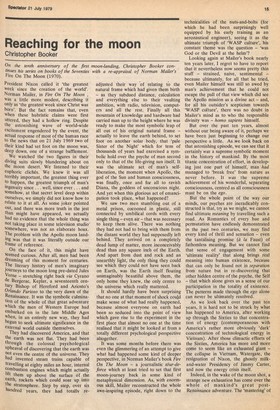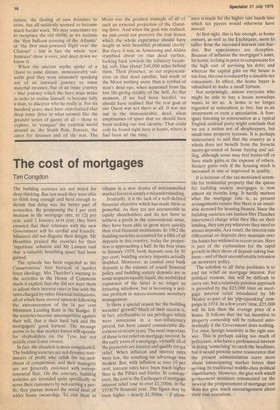Reaching for the moon
Christopher Booker
On the tenth anniversary of the first tinues his series on books of the Seventies Fire On The Moon (1970).
President Nixon called it 'the greatest week since the creation of the world'. Norman Mailer, in Fire On The Moon , was a little more modest, describing it only as 'the greatest week since Christ was born'. But the fact remains that, even when these hubristic claims were first uttered, they had a hollow ring. Despite the astonishing wave of world-wide excitement engendered by the event, the actual response of most of the human race to the news that on 21 July 1969 two of their kind had set foot on the moon was, deep down, one of a strange bafflement.
We watched the two figures in their diving suits slowly blundering about on the moon desert. We listened to their euphoric clichés. We knew it was all terribly important, the greatest thing ever to happen, the greatest triumph of man's ingenuity since. . . well, since ever . and somehow, at that secret level deep within ourselves, we simply did not know how to relate to it at all. As some joker pointed out, and there was more truth in the jest than might have appeared, we actually had no evidence that the whole thing was not taking place in some television studio' somewhere, was not an elaborate hoax. The problem with the Apollo moon landing was that it was literally outside our frame of reference.
On the face of it, this might have seemed curious. After all, men had been dreaming of this moment for centuries. The literary history of men's imaginary tourneys to the moon long pre-dated Jules Verne — stretching right back via Cyrano de Bergerac, Kepler, a seventeenth century Bishop of Hereford and Ariosto's Orlando Furioso to the very dawn of the Renaissance. It was the symbolic culmination of the whole of that great adventure Which the men of Western Europe had embarked on in the late Middle Ages When, in an entirely new way, they had begun to seek ultimate significance in the external world outside themselves.
They had discovered America, and that the earth was not flat. They had been through the colossal psychological Upheaval of discovering that the earth was not even the centre of the universe. They had invented steam trains capable of travelling at eighty miles an hour, internal Combustion engines which might actually lift them up above the surface of the earth, rockets which could soar up into the stratosphere. Step by step, over six hundred years, they had totally re moon-landing, Christopher Booker conwith a re-appraisal of Norman Mailer's adjusted their way of relating to the natural frame which had given them birth — as they subdued distance, calculation and everything else to their vaulting ambition, with radio, television, computers and all the rest. Finally all this mountain of knowledge and hardware had carried man up to the height where he was ready to make the most symbolic leap of all out of his original natural frame — actually to leave the earth behind, to set foot on another solar body, that 'pale Sister of the Night' which for tens of thousands of years had exercised a symbolic hold over the psyche of man second only to that of the life-giving sun itself. It was the ultimate act of man's selfliberation, the moment when Apollo, the god of the Sun and human consciousness, was finally, once and fox all to ravish Diana, the goddess of unconscious night. And yet when this glorious act of emancipation took place, what happened?
We saw two men stumbling out of a metal prison, cocooned in plastic, still connected by umbilical cords with every single thing— even air — that was necessary to keep them alive. There was nothing they had not had to bring with them from the distant world they had supposedly left behind. They arrived on a completely dead lump of matter, more inconceivably dead than any square inch of the Earth. And apart from dust and rock and an unearthly light, the only thing they could see which they could not have seen back on Earth, was the Earth itself floating unimaginably beautiful above them, the only home they knew, the only centre to the universe which really mattered.
It should hardly have been surprising that no one at that moment of shock could make sense of what had really happened, because almost everyone on earth had been so seduced into the point of view which gave rise to the experiment in the first place that almost no one at the time realised that it might be looked at from a totally different psychological perspective altogether.
It was some months before there was even the glimmering of an attempt to give what had happened some kind of deeper perspective, in Norman Mailer's book Fire On The Moon — a journalistic tdur-deforce which at least tried to set that first moon-journey back in some kind of metaphysical dimension. As, with enormous skill, Mailer reconstructed the whole awe-inspiring episode, right down to the technicalities of the nuts-and-bolts (for which he had been surprisingly Well equipped by his early training as an aeronautical engineer), seeing it as the ultimate triumph of 'WASP culture', his constant theme was the question — 'was God or the Devil at the helm'?
Looking again at Mailer's book nearly ten years later, I regret to have to report that it nevertheless now seems pretty thin stuff — strained, naive, sentimental — because ultimately, for all that he tried, even Mailer himself was still so awed by man's achievement that he could not escape the pull of that view which did see the Apollo mission as a divine act — and, for all his outsider's scepticism towards 'WASP culture', there was no doubt in Mailer's mind as to who the responsible divinity was — homo sapiens himself.
But over the past ten years, almost without our being aware of it, perhaps we have been just beginning to change our perspective a little. As we look back on that astonishing episode, we can see that it certainly was a supreme symbolic moment in the history of mankind. By the most titanic concentration of effort, in developing just one part of himself, man had managed to 'break free' from nature as never before. It was the supreme achievement of his wonderful, separating consciousness, centred as all consciousness must be on the ego.
But the whole point of the way our minds, our psyches are ineradicably constructed is that, try as we might, we cannot find ultimate meaning by travelling such a road. As Romantics of every hue and permutation have endlessly demonstrated in the past two centuries, we may find every kind of thrill and sensation — even the tantalising promise (t) la Faust) of fathomless meaning. But we cannot find that sense of engagement with some 'ultimate reality' that along brings real meaning into human existence, because that can only be found not in separation from nature but in re-discovering that other hidden centre of the psyche, the Self — that which alone gives us a sense of our participation in the totality of existence. The patterns made through the ego alone can never be ultimately resolved.
As we look back over the past ten years, it is hard not to be struck by what has happened to America, after working up through the Sixties to that concentration of energy (contemporaneous with America's rather more obviously 'dark' concentration of technological energy in Vietnam). After those climactic efforts of the Sixties, America has more and more come to seem like an exhausted giant — the collapse in Vietnam, Watergate, the resignation of Nixon, the ghostly milkand-water Presidency of Jimmy Carter, and now the energy crisis itself.
Indeed, in the wake of the moon shot, a strange new exhaustion has come over the whole of mankind's great postRenaissance adventure. The 'mastering' of nature, the finding of new frontiers to cross, has all suddenly seemed to become much harder work. We may sometimes try to recapture the old thrills, as we acclaim the 'first balloon crossing of the Atlantic' or 'the first man-powered flight over the Channel' — but in fact the whole 'new frontiers' show is over, and deep down we know it.
When the ancient myths spoke of a Quest to some distant, immeasurably valuable goal they were ultimately speaking not of an outward journey to some material treasure, but of an inner journey — that journey which the hero must make in order to realise himself, to become fully a man, to discover who he really is. For six hundred years, men have externalised that deep inner drive in what seemed like the greatest series of quests of all — those to explore, to 'conquer' the external world around us, the South Pole, Everest, the cures for diseases and all the rest. The Moon was the greatest example of all of such an external projection of the Questing drive. And when the.goal was realised, we just could not perceive the true lesson which the whole experience should have taught us with beautiful, profound clarity. But there it was, as Armstrong and Aldrin stumbled about on that dead surface, looking back towards the infinitely beautiful, soft, blue planet 240,000 miles behind them. Their presence, as our representatives on that dead satellite, had made of the Moon nothing more than a symbol of man's dead ego, when separated from the lost life-giving totality of the Self. At that moment, if we had been heedful, we should have realised that the real goal of our Quest was not there at all. It was not out in the immeasurable, dead, silent emptinesses of space that we should have been seeking our lost identity, That could only be found right here at home, where it had been all the time.



































 Previous page
Previous page